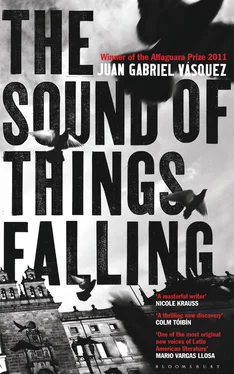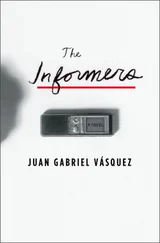The morning that followed one of those novenas, a cloudy, dark morning, Aura and I had our first ultrasound. Aura had been on the verge of cancelling it, and I would have done if that hadn’t meant waiting another twenty days to find out about the child, with the risks that might entail. It wasn’t just any old morning, it wasn’t a 21 December like any other 21 December of any other year: since the early hours of the morning the radio and television and newspaper had been telling us that American Airlines Flight 965, which departed from Miami for Alfonso Bonilla Aragón International Airport in the city of Cali, had crashed into the west side of El Diluvio Mountain the previous night. It was carrying one hundred and fifty-five passengers, many of whom weren’t even going to Cali, but were expecting to catch the last flight of the evening to Bogotá. At the time the news came out they’d found only four survivors, all with serious injuries, and the figure would not go any higher. I knew the inevitable details — that the plane was a 757, that the night was clear and starry, that they were starting to talk about human error — from the news broadcasts on all stations. I regretted the accident, felt all the sympathy I’m capable of for the people waiting for their relatives, and for those who, in their seats on the plane, understood from one moment to the next that they would not arrive, that they were living their last seconds. But it was an ephemeral and distracted sympathy, and I’m sure it had died out by the time we entered the narrow cubicle where Aura, lying down and half undressed, and I, standing by the screen, received the news that our little girl (Aura was magically sure it was a girl), who at that moment measured 7 millimetres, was in perfect health. On the screen was a sort of luminous universe, a confusing constellation in movement where, the woman in the white coat told us, our little girl was: that island in the sea — every one of her 7 millimetres — was her. Beneath the electric brightness of the screen I saw Aura smile, and I’m very afraid I won’t forget that smile as long as I live. Then I saw her put a finger on her belly to smear it with the blue gel the nurse had used. And then I saw her put her finger to her nose, to smell it and classify it according to the rules of her world, and seeing that was absurdly satisfying, like finding a coin in the street.
I don’t remember having thought of Ricardo Laverde there, during the ultrasound, while Aura and I, perfectly astonished, listened to the sound of an accelerated little heartbeat. I don’t remember having thought of Ricardo Laverde later, while Aura and I listed girls’ names on the same white envelope in which the hospital had given us the written report of the ultrasound. I don’t remember having thought of Ricardo Laverde while reading this report out loud, discovering that our little girl was in a fundal intrauterine position and she was a normal oval shape, words that made Aura erupt into violent fits of laughter in the middle of the restaurant. I don’t remember having thought of Ricardo Laverde even when I made a mental inventory of all the fathers of daughters that I knew, a little to see if the birth of a daughter had a predictable effect on people, or to start looking for sources of advice or possible support, as if I guessed that what I was heading into was the most intense, most mysterious, most unpredictable experience I’d ever live through. Actually, I don’t remember with any certainty what thoughts passed through my head that day or the days that followed — while the world went through its slow and lazy passage from one year to the next — other than those of my impending paternity. I was expecting a daughter, at the age of twenty-six I was expecting a daughter, and faced with the vertigo of my youth the only thing that occurred to me was to think of my father, who at my age had already had me and my sister, and that was after my mother and he had already lost their first baby. I didn’t yet know that an old Polish novelist had spoken a long time before of the shadow-line, that moment when a young man becomes the proprietor of his own life, but that was what I was feeling while my little girl was growing inside Aura’s womb: I felt that I was about to become a new and unknown creature whose face I couldn’t manage to see, whose powers I could not measure, and I also felt that after the metamorphosis there would be no turning back. To put it in other words and without so much mythology: I felt that something very important and also very fragile had become my responsibility, and I felt, improbably, that my abilities were equal to the challenge. It doesn’t surprise me that I barely have any vague notion of living in the real world during those days, for my fickle memory has drained them of all meaning or relevance other than that related to Aura’s pregnancy.
On 31 December, on our way to a New Year’s Eve party, Aura was going through the list of names, a yellow sheet of paper with red horizontal lines and a green double margin, covered in underlinings and crossings-out and marginal comments, that we’d started carrying with us everywhere and would take out at those dead times — in bank queues, waiting rooms, Bogotá’s famous traffic jams — when other people read magazines or imagine other people’s lives or imagine improved versions of their own lives. Few names had survived from the long column of candidates, along with the future mother’s corresponding note or prejudice.
Martina (but it’s a tennis player’s name)
Carlota (but it’s an empress’s name)
We were on the highway, driving north, under the 100th Street bridge. There was an accident up ahead and the traffic was almost completely stopped. None of that seemed to matter to Aura, involved as she was in considerations about the name of our daughter. Somewhere I could hear the ambulance’s siren; I checked the rear-view mirror, trying to find the swirling red lights demanding a way through, making its way, but I couldn’t see anything.
That was when Aura said, ‘What about Leticia? I think one of my great-grandmothers or somebody was called Leticia.’
I repeated the name once or twice, its long vowels, its consonants that mixed vulnerability and strength.
‘Leticia,’ I said. ‘Yes, sounds right.’
So I was a changed man the first working day of the year, when I arrived at the 14th Street billiard club and bumped into Ricardo Laverde, and I remember very well feeling surprised by my own emotions: sympathy for him and his wife, Señora Elena Fritts, and an intense desire, more intense than I ever would have expected, for their encounter during the holidays to have had the best possible consequences. He’d already started his game, on another table, and I started to play on my own. Laverde didn’t look at me; he was treating me as if we’d just seen each other the previous night. At some point in the afternoon, I thought, the rest of the customers would start leaving, and the usual ones would end up finishing off the evening like in musical chairs. Ricardo Laverde and I would meet, play a little and then, with any luck, we’d resume the conversation we’d started before Christmas. But that didn’t happen. When he finished his game I saw him return his cue to the rack, saw him start walking towards the door, saw him change his mind, and saw him walking over to the table where I had just finished my shot. In spite of the profuse sweat on his forehead, in spite of the tiredness bathing his face, there was nothing in his greeting that worried me. ‘Happy New Year,’ he said from a distance, ‘how were your holidays?’ But he didn’t let me answer, or rather he interrupted my answer somehow, or there was something in his tone of voice or in his gestures that let me know the question was rhetorical, one of those vacuous courtesies always exchanged by bogotanos, with no expectation of a sincere or considered response. Laverde took an old-fashioned black cassette tape out of his pocket, with an orange sticker on it and on the sticker the letters BASF . He showed it to me without moving his arm very far from his body, like someone offering some illegal merchandise, emeralds in the plaza, a folded paper of drugs beside the criminal court.
Читать дальше












